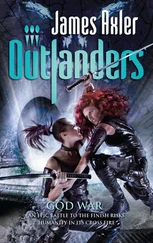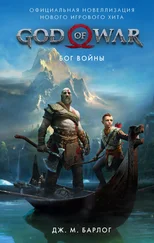The customs agents slid the door open. They both stared hard at him and told him to raise his arms.
Rhys felt a gut-churning moment of terror.
Nyx appeared just behind them and leaned against the doorway. She smirked. The fear bled out of him.
“Go easy on him,” she said. “He’s mine.”
She said it like he was her bakkie or a prized sand cat.
The bigger woman asked for Nyx’s passbook.
“I’m already coded for Mushtallah,” Nyx said. “I’m Nyxnissa so Dasheem.”
The woman clucked at her. “Who’d you kill to get you back in Mushtallah, Nyxnissa?”
“All the same sorts of people,” Nyx said.
“I haven’t seen you here since you went to prison.”
“For good reason, then,” Nyx said.
The matron laughed. “It’s not the prettiest city, but it’s still our best. Good women in prison, too.” She pulled up a sleeve and revealed a badly drawn tattoo of a sword and scattergun on a round shield.
Nyx snorted. “Gunrunning?”
“Good money,” the woman said. “Tirhanis don’t mind selling so long as we do all the work lugging it through the pass—and the time if we get caught.”
“So I hear,” Nyx said.
She would know, Rhys thought. How many gunrunners had Nyx slept with?
Both agents went through Rhys’s pockets. They didn’t find the pockets that kept his bugs, which improved his confidence in his ability to conceal items by altering the composition of the air around them. The skill had not been one of his best back in Faleen. Not that he was going to be able to keep the bugs on his person much longer. Mushtallah would take care of that.
One of the women, an ugly matron with a face the color and texture of boot leather, paged through his passbook. “You a resident alien?” she asked.
“I’m employed,” he said. “Everything is in order.”
She looked him up and down and made a moue of her mouth, as if contemplating whether or not to spit on him. Nyx pushed farther into the crowded room, arms crossed, and grinned at her.
The customs agent closed her mouth. “No doubt you are,” she said to Rhys, and dropped her eyes back to his passbook.
The one patting him down found his Kitab and laughed as she looked through it. “It’s the same damn book as ours. Same language and everything. You a convert?”
“No,” he said. “Chenjans have always had the same book. Unlike Nasheenians, however, we follow its teachings.”
“You speak the dead language?” the ugly one asked, ignoring the jibe.
“Only as much as you do.”
“Huh,” she said.
The language of the Kitab had been the same since the First Families brought it down from the moons. Even godless Nasheenians should have known that. Who taught the schools here? Atheists like Nyx? They killed atheists in Chenja.
The other one gave back his Kitab. They didn’t always. He’d lost a number of Kitabs going through customs.
The ugly one turned to Nyx. “You vouch for him, my woman?”
“You think I’d bring a terrorist into Mushtallah?”
“Only if you’re cutting off his head,” the ugly one said, and laughed again.
The matron finally pressed a thumb to the organic paper at the back of Rhys’s passbook.
“You keep hold of that,” she told him, “or the filter will eat you. No permanent residency, no permanent bio-pass into Mushtallah.” She flashed her teeth and gave Nyx a nod. “Good luck, my woman.”
The customs agents went back out into the hall. The door rolled shut behind them.
Rhys tugged at his coat, and returned his Kitab and passbook to his breast pocket.
Nyx sat at the window and put her feet up. “They were just flirting,” she said. “You don’t see a lot of men this far inland. And sure not Chenjan ones.”
“That’s not flirting.”
“You’ve seen worse.”
He turned away from her. “It doesn’t excuse them.”
“Stop mewling.” She paused, then relented. “You know I’ll do what I can to make it easy.”
“I know,” he said.
Rhys liked to think she defended him out of some kind of loyalty or affection, but most days he felt she guarded him the same way she did everything in her possession: He’s mine. He was just another thing to be owned and retained. Just another thing she could lose.
Once the customs agents were off-loaded, the train chugged into the station just outside Mushtallah. Rhys and Nyx gathered their things and then stepped onto the sandy platform overlooking the city.
“The most boring city in Nasheen,” Nyx declared, and trudged down the steps and onto the paved road.
Rhys had read that before Nasheen’s revolution two hundred fifty years ago, the gutters were full of dead babies and the mullahs wore vials of virgins’ blood toward off the draft. They’d bred sand cats for fights in the train workers’ ward, and the stink and smog of the city sent the First Families who lived up in the hills to the countryside every year during high summer.
The wealthy still fled the city in the summer—it looked deserted from the platform—but there weren’t any dead babies that he could see, and the last of the male mullahs had been drafted two centuries ago, right after the queen decreed that God had no place for men in mosques unless they had served at the front.
Mushtallah had been built on seven hills, but that was for beauty and breezes, not for defense. When Mushtallah was founded, there hadn’t been much to defend the city from but wild sand cats and some of the more virulent strains of bugs that had gotten away from their magicians or bled down from the twisted mess of the Khairian wasteland in the north. That had all changed, of course, when the war started.
The first wall that rose around the city was an organic filter that kept foreign bug tech out. Every ten yards, a hundred foot faux stone pillar jutted up from the packed, sandy soil. The bug filters that stretched from pillar to pillar made the air shimmer like a soap bubble. Organic filters were a necessity in a country bombarded by all manner of biological, half-living, semi-organic weaponry. Destruction entered cities as often through contaminated individuals as it did through munitions. Filters were magician-made and could be tailored to keep out anyone and anything organic. It was a matter of introducing the bugs powering the filter to the unwanted contagion or—in the case of Mushtallah—only coding the filter to allow in particular individuals. The fact that Rhys had gotten through customs unmolested was a testament to how highly regarded Nyx was by the customs agents.
As they approached the filter, Rhys called up a handful of flying red beetles. He held out his hand, and a dozen swarmed about his fingers.
“We’ll be out of contact, Taite,” he said. “We’re going into Mushtallah.”
“Sure thing.” Taite’s voice carried just over the singing of the beetles, a second song. “Tell me when you come back to civilization.” Rhys flicked his wrist, and the beetles dispersed. He dug through his pockets and released three locusts and a couple of screaming cockroaches he kept in magicians’ cages for emergencies. All the bugs had sense enough to head away from the filter. He would need to call or buy more when they got back to Punjai.
Nyx turned in time to see the swarm recede. “You clean?” she asked.
He showed her his empty pockets.
Nyx bled through the gate.
Rhys took a deep breath. Nyx stood on the other side, whole, and stopped to look back at him. He still wasn’t entirely convinced about the safety of entering Mushtallah. How far would those agents take their “flirting”? Far enough to tell him that the filter had been coded to let him through, then stand at the train windows and laugh as he stepped through the filter and disintegrated into gray ash?
Читать дальше
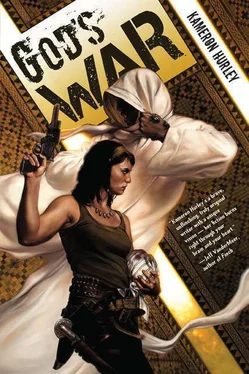
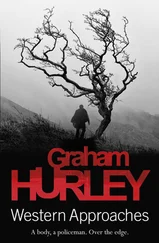
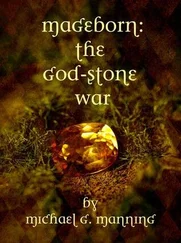



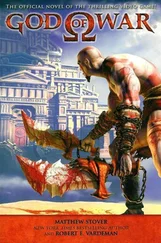

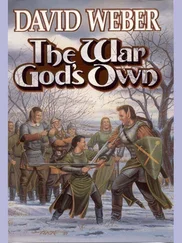
![Дж. М Барлог - God of War. Бог войны [Официальная новеллизация] [litres]](/books/413051/dzh-m-barlog-god-of-war-bog-vojny-oficialnaya-no-thumb.webp)
